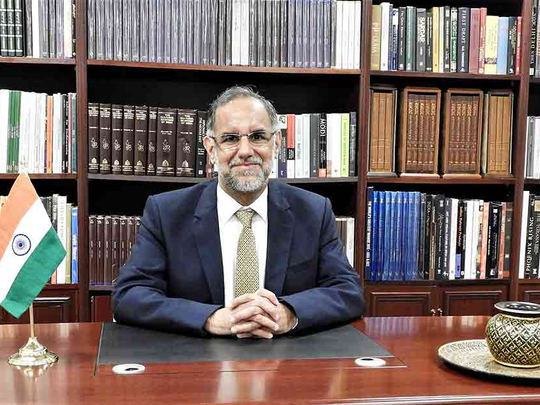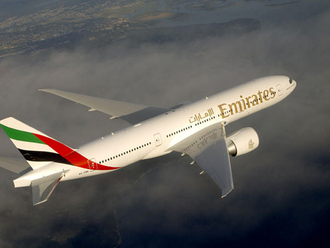
The friendship between India and the UAE nurtured for centuries through trade and people-to-people contacts has evolved into a deep and comprehensive relationship, thanks to the strategic direction given by the political leadership of both the countries.
High-level visits
The visit of Indian Prime Minister Narendra Modi to the UAE in 2015 infused energy and direction into an already strong relationship. History was created when His Highness Shaikh Mohammad Bin Zayed Al Nahyan, Crown Prince of Abu Dhabi and Deputy Supreme Commander of the UAE Armed Forces, visited India in 2016 and again in 2017 as the chief guest for the Republic Day celebrations in Delhi.
Modi’s second visit to the UAE in February this year saw India being awarded 10 per cent stake in the Lower Zakum Oil Field in Abu Dhabi, transforming the energy relationship to a strategic partnership for energy security.
The Prime Minister also delivered his keynote address at the World Government Summit 2018, where India was the guest of honour, sharing India’s experience of transforming millions of lives through technology.
Thanks to the UAE leadership that has always promoted tolerance and peaceful coexistence, a desire of the Indian community was also fulfilled when the PM participated in a breaking ground ceremony of the first Hindu temple in Abu Dhabi.
The momentum imparted by high-level visits has been sustained by regular interactions at the ministerial levels. Recently, Shaikh Abdullah Bin Zayed Al Nahyan, UAE Minister of Foreign Affairs and International Cooperation, visited India for a week in June this year and called upon the Indian Prime Minister and External Affairs Minister, Sushma Swaraj.
Earlier in March, Shaikh Hamad Bin Zayed Al Nahyan, Chief of the Abu Dhabi Crown Prince’s Court, visited India, leading a high-level delegation that included Dr Sultan Ahmad Al Jaber, Minister of State and Group CEO of Adnoc and Dr Thani Bin Ahmad Al Zeyoudi, UAE Minister of Climate Change and Environment to the founding conference of the International Solar Alliance (ISA).
The visit of Dr Anwar Gargash, UAE Minister of State for Foreign Affairs in the same month set the agenda for the year. Our energy sector ties have undergone a quantum shift, from a normal buyer seller relationship to being strategic partners in energy security. History was created when an agreement was signed between Abu Dhabi National Oil Company (ADNOC) and India Strategic Petroleum Reserve (ISPRL) for storage of 5.86 million barrels of oil in Mangalore. Active discussions for partnering in a second strategic reserve in India are now on.
Trade and investment
India-UAE trade remained steady despite global headwinds. During fiscal year 2017-18 bilateral trade was valued at about $50 billion, (Dh183.6 billion) making India the second-largest trading partner of the UAE, while the UAE continued to be India’s third-largest trading partner. Last year saw a flurry of investments by UAE companies in India, with both nations on track to realise the target of
$75 billion investment in India by the UAE.
Significant investments include the $1-billion agreement signed between National Investment and Infrastructure Fund (NIIF) and Abu Dhabi Investment Authority (Adia), the $1-billion fund created by HDFC Capital Advisors and Adia to invest in the affordable housing sector, the $3-billion fund set up by NIIF and DP World to invest in India’s logistics sector, and the $11-billion investment by Adnoc in the greenfield Ratnagiri refinery in India.
DP World has also signed an agreement with Jammu and Kashmir to set up a logistics hub, while Emirates Airlines signed an agreement with Andhra Pradesh to set up an aviation maintenance and repair hub. Another positive trend is the investments by UAE based NRI groups like Lulu, BRS Ventures, Aster, KEF, Zulekha, the Sobha Group and others in Indian states.
Investments by UAE firms have not only contributed to the development of Indian infrastructure but also provided jobs to thousands. Future plans include partnership in food processing, the logistics sector, renewable energy, defence manufacturing and artificial intelligence.
Investments by UAE firms have not only contributed to the development of Indian infrastructure but also provided jobs to thousands. Future plans include partnerships in food processing, the logistics sector, renewable energy, defence manufacturing and artificial intelligence.
Cultural ties and remittance
The values of peace, tolerance and love, so dear to the founding fathers of India and the UAE, Mahatma Gandhi and late Shaikh Zayed respectively, remain guiding principles for both nations. It also led to the launch of the Gandhi-Zayed Digital Museum at Abu Dhabi, announced during the visit of Shaikh Abdullah to India in June.
The large Indian diaspora has also helped the Indian economy through remittances with the UAE becoming the largest source of remittances for India at $13.82 billion in 2017.
The Indian embassy and the consulate general are also providing all possible help to Indians wishing to regularise their residency status or leave the UAE under the Amnesty Scheme 2018, launched by the UAE Government, with a dedicated helpdesk, email ID and phone numbers being made operational to help them.
As we look back at our achievements, it energises us and gives us confidence that a lot more can be done together. I would like to thank the leadership of the UAE and its citizens who welcomed the Indian community with open arms and helped our bilateral relationship reach new heights. I wish all members of the Indian community a happy Independence Day.







